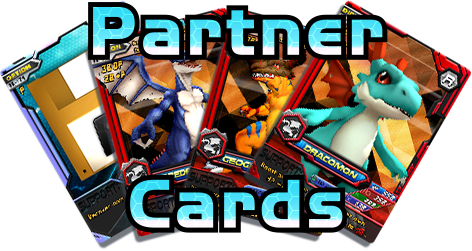
What’s a Partner?
A partner can be any Level R (Rookie) in the game. You’ll want to have one in every deck, since they confer distinct and inarguable advantages that normal Rookies just don’t offer. Things can get a bit complicated, so it’s let’s break down what a partner can do:
- Evolve very quickly, before the Evolution Phase even
- Toolbox one of two specific Champions for you
- Ignore DP and type while evolving from the Destiny Zone
- Use certain Option/Evolution/DATA cards as a proxy
How are they used?
Partners can be used in one of a couple scenarios in the game, and have several rules tailored specifically for odd cases they create. They’re essentially, a dedicated rule-breaker. Here are some of the scenarios, and a walkthrough of how partners change them:
Prep Phase: Normally, when you place a Rookie onto your empty Active zone during the Preparation Phase, you have to wait to evolve it. Partners change this! You can immediately evolve from the Destiny Zone to one of your two Champion forms. This is similar to the Armor evolutions from the original Digimon Card Battle video game. Each Champion might have their own strengths and weaknesses.Evolution Phase: You’ll be able to Rack-Up DP, but you’ll have to skip everything else if you destiny evolved during the Prep Phase. That’s just the cost of having an easy toolbox! You won’t ever be able to destiny evolve and then play an evolution card like Level Crush on the same turn.
Proxy Card: This is a card with a “P” in the upper left corner. You choose up to one card with this symbol for deck creation and place it into your destiny zone. When the time is appropriate (such as Supporting), you can discard your Partner from hand, if able, and substitute this “Proxy” from the DZ. Afterward, like all DZ cards leaving a zone, it is deleted. Pay attention to the timing of the proxy: while it’s usually “Support”, it can sometimes be the Any Phase of a DATA card (or DNA of it), or Evolve. Reminder: You never have to use the effects, even if you have a proxy with a Support ability and you support with your partner—you can choose to use your partner’s effect instead. This is a similar feature to the Digimon Card Battle video game’s customizable “digi-parts”.
DNA Evolving: This is technically in the previous category, but there is a fundamental difference. Since DATA cards can be “partnered” as your option, they can be called upon while performing DNA by discarding your Partner, then deleting the appropriate DATA card from your destiny zone. You would then follow normal DNA procedures.
Battle Phase: When your partner Rookie is in an active zone that gets KO’d, you get it back! As if your partner would give up that easily. It shuffles back into your deck and rests until you draw it for later use. Be careful though! Since any card that leaves a new zone after it comes from the DZ is always deleted, this means the partnered Champion from the DZ is deleted. You won’t be able to use that Champion again. Your partner will get less and less useful as the game progresses.
Summary
Partners are obviously powerful, modular, and have a wide range of utility. They’re also limited in that you can only have 1 Partner (copy) in your deck, 2 Champions in the DZ (and they have to have your Partner’s name in their evo-box), and 1 proxy in the DZ. However, mastering the partner card will take your game to the next level and allow you to outplay those that are lagging behind.

Leave a comment